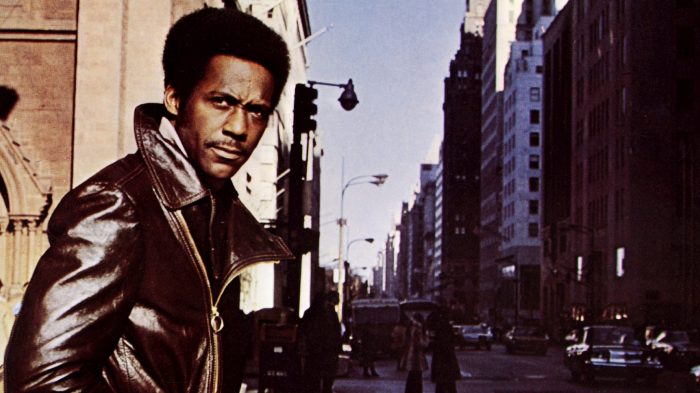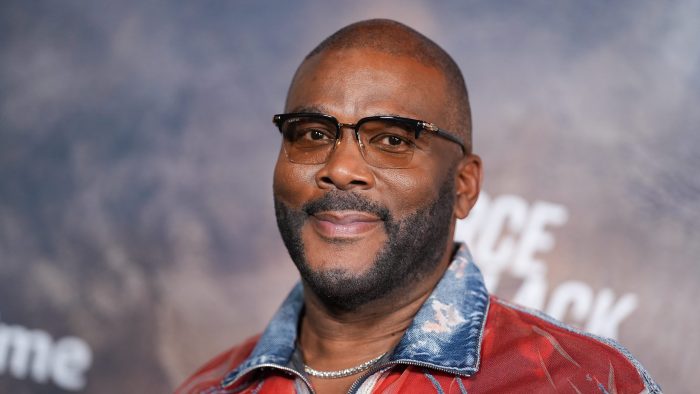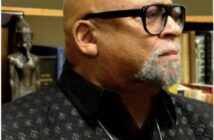Tyler Perry has done it again.
He released another movie, Prime Video’s Divorce in the Black, starring Meagan Good and Cory Hardrict. The film has been universally panned by critics, earning a rare 0% on Rotten Tomatoes. And yes, like many of Perry’s other projects, it traffics in played-out tropes, featuring abused Black women and illogical plot turns. As always, Perry’s newest film has reignited the debate about the value of his movies and their placement on the scale that ranges from uplifting and fun to an embarrassment to Black people. These conversations have existed since Perry first donned a wig and called himself Madea. But the more interesting question is: What value does Tyler Perry find in his art, and what will propel him to make that art better?
Divorce in the Black is standard Tyler Perry fare. It’s a movie about a woman (Good) who is abused by her husband (Hardrict), and her only salvation comes in the form of a new man. The source of the abusive man’s trauma seems to have come from his mother, of course. The movie’s most striking moment happens in the first scene, which takes place during a funeral and ends with a mother taking her son’s body out of the casket. The scene, which has gone viral for its ridiculousness, is outrageous, poorly acted, and doesn’t factor into the rest of the movie’s plot. And it’s indicative of the movie as a whole. Divorce in the Black was full of plot holes, lacked any backstory and was overall incoherent. I laughed more than I felt an actual connection to the story and its characters. And this has been my experience with most of Perry’s films, especially in the last few years.
Related Story
Will Smith doesn’t need a redemption tourRead now
Since bursting on the scene, Perry has made over 50 films — many with poor scripts, shaky camera work, and varying production. Pressing play on a Tyler Perry DVD from 2005 doesn’t provide any different quality than queuing one up on a streaming platform today.
But that doesn’t seem to be why Perry makes movies. In the same way Starbucks effectively operates as a bank that sells coffee, Perry is a businessman with a dynamic personality who also makes movies. As the owner of Tyler Perry Studios, the multimillion-dollar complex in Atlanta where everything from Marvel Entertainment movies to his films are shot, Perry is also a real estate mogul. And he’s a motivational speaker, using his story to uplift Black folks worldwide. The movies are part of the brand, but they’re one tenet of the Perry-verse he’s been creating for decades.
I first heard of Perry in the early aughts as bootlegged videos of his plays went platinum in Black households across the South. Black Christian plays had always been popular, but Perry’s productions, especially those involving his Madea character, immediately stood out for being as hilarious as they were full of drama. The plot of each play was secondary to the enjoyment fans got from watching them and the religious messages they delivered at the end. This is how Perry cultivated his passionate fanbase — many still loyal to him to this day, watching his films despite the bad reviews or perceived shortcomings.
That’s because to have followed Perry for this long is to buy into his journey as much as his output. And it’s hard to hear his story and not find it inspirational. The man who wrote his early works while living in his car and went into massive debt to fund his plays made it — and we’ve watched him the entire step of the way. And to be a fan of Perry also means to have heard his story, in his own words, which is a gift in itself as he is legitimately a great public speaker. Even as someone critical of his art, I’ve still been enthralled by Perry’s speeches.
Related Story
 Richard Roundtree was famous for ‘Shaft.’ But that wasn’t his most important role.Read now
Richard Roundtree was famous for ‘Shaft.’ But that wasn’t his most important role.Read now
Added to Perry’s powerful story is the outpouring of love he receives from his peers. His movies often give actors second chances or simply line their pockets when they’re in need. Taraji P. Henson has credited Perry with being the first director to pay her what she felt she was worth.
“I was asking for half a million,” she told Variety in 2019. “I didn’t get paid that until I did my first Tyler Perry film. He was the first person that broke the standard that I was getting paid for films.”
Hardrict has gone on record to say his salary for Divorce in the Black was the most he’d been paid as an actor to date. Perry also gave actors like Teyana Taylor, Lance Gross and Tessa Thompson their first featured roles. And while Idris Elba had already starred as Stringer Bell for three seasons on The Wire, it was Perry who first made him a leading man on film. Perry’s altruism towards Black folks in Hollywood has made it so that any time his name is mentioned by its most powerful Black stars, it’s mentioned with praise and glowing anecdotes about his character.
The genuine love Perry’s peers and fans feel towards him is part of a carefully curated ecosystem and the lens through which his movies are judged. Sure, the films generally don’t give us good writing or deep plots, but they aren’t judged merely by what we see on the screen. They’re viewed as extensions of the Perry experience, and to criticize his movies is to criticize all that he represents. Bringing attention to the plot holes then becomes about something more: it’s seen as trying to take money out of the pockets of a man who uses that money to uplift Black people.
It doesn’t matter that Perry has also used his considerable wealth and influence in battles with writers and writer unions. He allegedly fired four writers for union activity in 2008. He also reportedly wouldn’t sign Writers Guild of America contracts, choosing instead to work with non-union talent. The Actors’ Union also boycotted his 2015 play, Madea On The Run, as he didn’t sign a contract with them either. His ability to write and direct his own projects is branded as a testament to his work ethic, but it also allows him to side-step dealing with unions, which fight for fair compensation and benefits for their members.
Related Story
 ‘Silver Dollar Road’ shows how Black land is repeatedly – and legally – stolenRead now
‘Silver Dollar Road’ shows how Black land is repeatedly – and legally – stolenRead now
Then there’s the matter of the movies — and not just the quality of their storytelling. Beyond the plot shortcomings, Perry’s films often perpetuate colorism, misogyny, moralizing and stereotypes about Blackness, gender and who deserves retribution. These are genuine and valid critiques of Perry’s work. And they deserve interrogation.
However, part of Perry’s brand positioning is an understanding that there’s a cap on the quality of his movies. Nobody watches them expecting an Academy Award-winning film or anything remotely close to it. Even his fans will tell you that his best movies are good “for Tyler Perry.” See, his universe includes its own unique rating system. And if Rotten Tomatoes gives a movie 0%, then the movie has sold itself, as that’s even more incentive for fans to either defend his work or for critics to tune in to see just how bad the movie could be. That level of engagement is music to any streamer’s ears, as all they want is eyes on their product, which Perry provides.
At this point, Tyler Perry is too powerful for anyone to make him do anything he doesn’t want to do. And he doesn’t seem to want to make better art. He can regurgitate the same tropes to varying levels of outlandishness and guard himself with his legacy and good deeds. He can make poorly-reviewed movies because people are still going to watch them. He can cover his issues with unions in charity to the most forward-facing actors in his employ. And he can continue to be the powerful, self-sufficient Hollywood force with no path to slowing down.
That’s the Tyler Perry experience. And it’s something to remember next time a movie opens with something as nonsensical as a family pulling a dead man from his casket.
David Dennis Jr. is a senior writer at Andscape, and the author of the award-winning book “The Movement Made Us: A Father, a Son, and the Legacy of a Freedom Ride.” David is a graduate of Davidson College.



